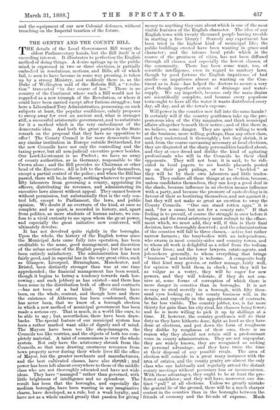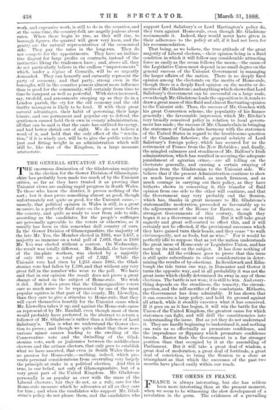THE GENTRY AND VFW, COlTNTY BILL. T HE details of the
Local Government Bill weary the oldest Parliamentary hands, but the Bill itself is of exceeding interest. It illustrates to perfection the English method of doing things. A desire springs up in the public mind, is expressed in two or three elections, is partially embodied in resolutions, motions, and Bills, all of which fail, is seen to have become in some way pressing, is taken up by a strong Ministry, and suddenly there is, as the Duke of Wellington said of the Reform Bill, a " r3volu- tion " transacted "in due course of law." There is no country of the Continent where such a Bill would not be regarded as a new triumph of the Revolution, or where it could have been carried except after furious struggles ; but here a Liberalised Tory Administration, possessing, on such subjects at least, the popular confidence, calmly proposes to sweep away for ever an ancient and, what is stranger still, a successful aristocratic government, and to substitute for it a method which is the very embodiment of the democratic idea. And both the great parties in the State remark on the proposal that they have no opposition to offer ! The County Council is far more democratic than any similar institution in Europe outside Switzerland, for the new Councils have not only the controlling and the taxing power, but all non-judicial executive power besides. Our Lord-Lieutenant is no Prefect ; we have no army of county authorities, as in Germany, responsible to the Crown alone ; and the Bill provides no Chairman or other head of the Executive. All is left to the people themselves, except a partial control of the police ; and when the Bill has passed, there will be, in theory, nothing whatever to prevent fifty labourers from governing a county, appointing its officers, distributing its revenues, and administering its executive laws almost without appeal. They cannot borrow without permission, but substantially that is the only con- trol left, except to Parliament, the laws, and public opinion. We doubt if an overturn of the kind, at once so complete and so quiet, is recorded in history, and, apart from politics, as mere students of human nature, we con- fess to a vivid curiosity to see upon whom the great power, and especially the great initiative now conferred, will ultimately devolve. It has not devolved quite rightly in the boroughs. Upon the whole, the history of the English towns since the Municipal Acts came fully into operation, has been creditable to the sense, good management, and discretion of the urban section of the English people ; but it has not been entirely satisfactory. The administration has been fairly good, and in especial has in the very great cities, such as Glasgow, Liverpool, Birmingham, Manchester, and Bristol, been distinctly stronger than was at one time apprehended ; the financial management has been sound, though it begins to betray a tendency towards rash bor- rowing; and such jobbery as has existed—and there has been some in the distribution both of offices and contracts —has not been of a bad kind. The citizens have been, on the whole, content, and though here and there the existence of Aldermen has been condemned, there has never been, that we know of, a borough election in which a new method of municipal government has been made a serious cry. That is much, in a world like ours, to be able to say ; but, nevertheless, there have been draw- backs. The special feature of our municipal system has been a rather marked want alike of dignity and of mind. The Mayors have been too like shop-managers, the Councils too like vestries, and. the objects of both too com- pletely material A taint of commonness is over the whole system. Not only have the aristocracy shrunk from the Councils, so that men drawing enormous revenues from town property never during their whole lives fill the office of Mayor, but the greater merchants and. manufacturers, and the best cultivated classes, have also shrunk ; and power has been left almost everywhere to those of the middle class who are not thoroughly educated and have not wide ideas. They have " managed " rather than governed, with little brightness of intelligence and no splendour. The result has been that the boroughs, and especially the medium boroughs, have been wanting in any imaginative charm, have developed, as a rule, but a weak loyalty, and have not as a whole excited greatly that passion for giving money to anything they care about which is one of the most visible features of the English character. The idea of any English town with twenty thousand people having trouble in starting a free library ! Scarcely any experiment has• been tried in the highest kind of municipal life ; the public buildings erected have been wanting in grace and character ; and the intense local pride .which is the source of the greatness of cities, has not been diffused through all classes, and especially the lowest classes, of the community. There has been some want, too, of scientific intelligence, even in regard to sanitary laws, though by good fortune the English impatience of bad smells—an impatience almost as wanting on the Con- tinent as in Asia—has helped the doctors to secure a very good. though imperfect system of drainage and water- supply. We say imperfect, because only the main drains are scientifically complete, and because every populous. town ought to have all the water it wants distributed every day, all day, and at the town's expense.
Will power in the counties now fall into the same hands ? It certainly will if the country gentlemen take up the pre- posterous idea of the City magnates, and think municipal affairs altogether beneath their notice ; and. of this there is,. we believe, some danger. They are quite willing to work at the business, more willing, perhaps, than any other class,. and they understand it thoroughly ; but they shrink, it is said, from the coarse canvassing necessary at local elections, they are disgusted at the sharp personalities bandied about, and. they at once dread and. dislike the kind of agitating professionals who will in the Councils be their chief opponents. They will not bear, it is said, to be ridi- culed in local papers, to see hostile placards posted up on their park palings, or to be " heckled " as they will be by their own labourers and little trades- men. They endure all these things at an election, because,. unless candidates themselves, they can keep a good. deal in the shade, because influence in an election means influence with a party, and because the pressure of caste-feeling is favour of their so bestirring themselves, and not against it ; but they will not make so great an exertion to sway the County Councils. "One can stand rotten eggs," it is said, "for a cause, but not for a county rate." If that. feeling is to prevail, of course the struggle is over before it. begins, and the rural aristocracy must submit to the efface- ment which, we must add, they will, if this is their final decision, have thoroughly deserved ; and the administration of the counties will fall to three classes,—active but rather narrow farmers ; the busybodies with an independence,. who swarm in most country-sides and country towns, and. to whom all work is delightful as a relief from the tedium of their lives ; and the lower lawyers, estate-agents, and job-seekers generally, to whom everything that brings. " business " and notoriety is welcome. A composite body of that kind may govern, or rather manage, fairly well,. for opinion will hold them in check ; but they will be as vulgar as a vestry, they will be eager for new powers, and they will tolerate, if they do not con- nive at, some forms of corruption of which there is more danger in counties than in boroughs. It is not so easy to steal secretly in a borough, with fifty thou- sand eyes looking on ; but county business will, in ita- details, and. especially in the apportionment of contracts, be far less visible. The country jobber, too, is far more thirsty for gain than his city rival, his chances being fewer; and he is more willing to pick it up by shillings at a. time. If, however, the country gentlemen will do their duty as they have hitherto done, fight as hard as they have done at elections, and put down the form of roughness they dislike by roughness of their own, there is no reason why they should not retain still a predominant voice in county administration. They are not unpopular,. they are widely known, they are recognised as seeking no personal advantage, and they have twice the time- at their disposal of any possible rivals. The area of. election will coincide in a great many instances with the area of estates, and the county gentry are almost the only class who can habitually and regularly attend the distant county meetings without pecuniary loss or inconvenience. With these advantages, they ought to be at least the pre- ferred candidates ; and they will have, moreover, one dis- tinct " pull " at all elections. Unless we greatly mistake the general lie of the ground, there will be a much sharper contest in the counties than in the boroughs between the. friends of economy and the friends of expense. Much work, and expensive work, is still to do in the counties, and at the same time, the country-folk are angrily jealous about rates. When these begin to rise, as they will rise, to borough figures, the quarrel will grow very keen, and the gentry are the natural representatives of the economical side. They pay the rates in the long-run. They do not compete for the appointments. They have an instinc- tive disgust for large profits on contracts, instead of the instinctive liking the tradesmen have ; and, above all, they do not particularly believe in the endless " improvements " which, under a regime of Councils, will be so urgently demanded. They can honestly and earnestly represent the party of economy, and that party, strong even in the boroughs, will in the counties possess almost more influence than is good for the community, will certainly from time to time be rampant as well as powerful. With rates increased, say, twofold, and assessments creeping up as they do in a London parish, the cry for the old economy and the old thrifty managers is likely to be loud. If with their great natural advantages, their habit of governing, their large leisure, and one permanent and popular cry to defend, the gentlemen cannot hold their own in county administration, all that can be said is that the caste has outlived its energy, and had better shrink out of sight. We do not believe a word of it, and hold that the only effect of the "revolu- tion," if it is wisely met, will be to give the public voice its just and fitting weight in an administration which will still be, like that of the Kingdom, in a large measure aristocratic.



































 Previous page
Previous page